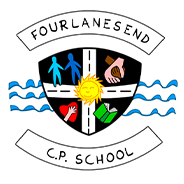Computing
Our Intent
To equip pupils with the skills and knowledge to become digitally literate, able to use technology effectively and responsibly, and to understand and apply computational thinking in various contexts, preparing them for the digital world and future opportunities.
Knowledge Facts
The answers to all of our ‘Big Questions’ form our Forever Facts. This is the knowledge that we think our children need to remember from their Computing lessons in future years, well beyond when they have left their year group and when they have left Fourlanesend C P School. We have ‘Recall’ in all lessons, quizzing the children about past weeks, past topics and even past years learning.
-
Computing - Big Questions
download_for_offline
download_for_offlineComputing - Big Questions
- Computing - Forever Facts download_for_offline
download_for_offlineComputing - Forever Facts
Implementation
At Fourlanesend we use the Teach Computing Curriculum (NCCE) which is a comprehensive collection of materials produced to facilitating the delivery of the KS1 and KS2 English computing curriculum.
The National curriculum purpose of study states: ‘The core of computing is computer science, in which pupils are taught the principles of information and computation, how digital systems work, and how to put this knowledge to use through programming. Building on this knowledge and understanding, pupils are equipped to use information technology to create programs, systems, and a range of content. Computing also ensures that pupils become digitally literate – able to use, and express themselves and develop their ideas through, information and communication technology – at a level suitable for the future workplace and as active participants in a digital world’. Therefore, the Kapow Primary scheme of work is designed with three strands which run throughout:
Computer science • Information technology • Digital literacy
Our Progression of skills shows the skills that are taught within each year group and how these skills develop year on year to ensure attainment targets are securely met by the end of each key stage. 3 The Kapow Primary scheme is organised into five key areas, creating a cyclical route through which pupils can develop their computing knowledge and skills by revisiting and building on previous learning:
Computer systems and networks • Programming • Creating media
Data handling • Online safety
The implementation of NCCE Primary Computing ensures a broad and balanced coverage of the National curriculum requirements, and our ‘Skills showcase’ units provide pupils with the opportunity to learn and apply transferable skills.
Where meaningful, units have been created to link to other subjects such as science, art, and music to enable the development of further transferable skills and genuine cross-curricular learning. Lessons incorporate a range of teaching strategies from independent tasks, paired and group work as well as unplugged and digital activities. This variety means that lessons are engaging and appeal to those with a variety of learning styles. Differentiated guidance is available for every lesson to ensure that lessons can be accessed by all pupils and opportunities to stretch pupils’ learning are available when required.
Knowledge organisers for each unit support pupils in building a foundation of factual knowledge by encouraging recall of key facts and vocabulary. The computing curriculum has been created to ensure teaching staff deliver lessons that are of a high standard and ensure pupil progression.
-
Computing-Skills-Progression
download_for_offline
download_for_offlineComputing-Skills-Progression
- Curriclum Journey Primary 2024 2025 download_for_offline
↑download_for_offlineCurriclum Journey Primary 2024 2025
- KS1 Computing Overview download_for_offline
download_for_offlineKS1 Computing Overview
- KS2 Computing Overview download_for_offline
download_for_offlineKS2 Computing Overview
Strategies for supporting pupils with Special Educational Needs and Disabilities in Computing lessons:
-
Computing
download_for_offline
download_for_offlineComputing
Opportunities
Integrating oracy and speaking and listening opportunities into computing lessons in primary schools can significantly enhance students’ communication skills and deepen their understanding of technology. Some of the ways this can be achieved include:
- Collaborative Projects: Encourage students to work in pairs or small groups on coding or multimedia projects. This fosters discussion, idea sharing, and collaborative problem-solving.
- Presentations and Demonstrations: Have students present their projects or demonstrate how they solved a particular problem. This helps them articulate their thought processes and technical knowledge.
- Class Discussions: Facilitate class discussions on topics like internet safety, the impact of technology on society, or ethical issues in computing. This encourages critical thinking and respectful debate.
- Role-Playing: Use role-playing activities to simulate real-world scenarios, such as troubleshooting a computer issue or explaining a new app to a non-technical person. This helps students practice clear and effective communication.
Recommended Links
Staying safe online parental help
An interactive game for children to make wise online choices
Love Minecraft? Love coding? This one's for you!
Impact
At Fourlanesend, we have chosen to use the NCCE Primary Computing scheme. This aims to instil a sense of enjoyment around using technology and to develop pupil’s appreciation of its capabilities and the opportunities technology offers to create, manage, organise, and collaborate. Tinkering with software and programs forms a part of the ethos of the scheme as we want to develop pupils’ confidence when encountering new technology, which is a vital skill in the ever evolving and changing landscape of technology.
Through our curriculum, pupils not only have digital competent and transferable skills for the future workplace, they also become responsible online citizens.
Assessment
Every computer lesson has a question as its title. By the end of unit, children are expected at the very least to remember facts that will enable them to answer these questions. These forever facts are revisited at the beginning of art lessons and throughout the year, along with facts that have been taught in pervious year groups.
- Curriclum Journey Primary 2024 2025 download_for_offline
- Computing - Forever Facts download_for_offline

